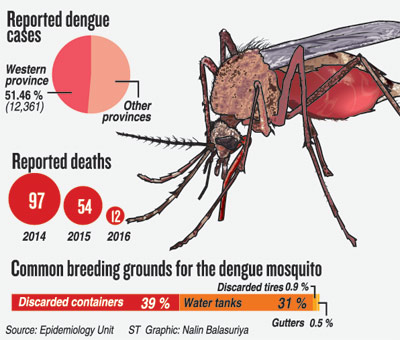News
Authorities despair at public unconcern over dengue

Battle against dengue: An STF personnel check a cupful of water that has mosqito larvae in it, from a housing scheme compound in Colombo. Pic by Indika Handuwala
Arrests are being made over dengue breeding sites as despite high mortality rates piles of rubbish, discarded containers collecting water and uncleaned premises continue to act as fertile breeding grounds for mosquitoes.
“The reason we resorted to making arrests is because it would make people take notice and this makes them take extra precautions,” Director of Environmental Police Division Quintus Raymond said
“There is no cure for dengue, yet people still turn a blind eye to it. It is only when a death occurs that they turn and point fingers at the health authority.
“There have been many occasions where we have made arrests and filed cases in court. A fair warning is given to each household prior to the arrests,” he said. Dengue has claimed the lives of approximately 1,190 lives in the past seven years. The dengue mosquito also carries chikungunya, yellow fever and zika.
Last year, 783 individual dengue breeding offenders were fined up to Rs. 2.6 million and action taken against 300 public institutions.
Public interest in dengue awareness campaigns was “minimal”, the Chief Medical Officer of Health (CMOH), Dr. Ruwan Wijayamuni said.
“Most people wait till our officials come and clean up their premises, quite often just looking out through their windows at the clean-up operations,” she said.
Piles of rubbish bags left on the road and empty yoghurt cups collecting water are ideal mosquito breeding grounds, raising the threat of dengue.
Containers carelessly thrown out of trains plying along the Maradana, Maligawatta, and Fort and Dematagoda Railway tracks by railway commuters have also become major breeding grounds for the dengue mosquito.
The failure of local councils to collect garbage is worsening the spread of dengue.
Dr. Hasitha Tissera a specialist attached to Epidemiological Unit in the Health Ministry said the authorities should take immediate action to rectify the problems in garbage collection.
“Garbage bags sometimes are not collected for days, making them an ideal breeding spot for mosquitoes,” Dr Tissera said, adding that lack of public participation in clearing infestation-prone belongings and local environments has caused primary concern among the officials. Many of them believe that this virus, which has no cure, could only be countered through public co-operation.
Approximately 12,361 (51.46 per cent) of dengue cases have been reported from the Western Province so far this year, 12 of them ending in death. Last year, 54 people died and in 2014 97 deaths were reported.
Dr. Tissera said that, Colombo has the highest dengue population with major breeding spots being Maligawatta, Kirulapone, Bambalapitiya, Wellampitiya, Modera, Mattakkuliya and Punchi Borella.
“Common breeding grounds for the dengue mosquito include discarded containers (39 per cent), water tanks (31 per cent), discarded tyres (0.9 per cent), gutters (0.5 per cent),” Dr. Tissera said. “We visited 8,641 schools and in 4,469 of them we discovered potential breeding sites for these mosquitoes – 225 of these places were confirmed positive.”
National Dengue Control Unit (NDCU) Consultant Community Physician Dr. Preshila Samaraweera said there was no specific treatment for dengue fever and the only method to curb the disease is to destroy or prevent the spread of dengue mosquito breeding sites.
“This situation warrants regular removal of possible mosquito breeding sites from the environment. It is also important to seek medical attention in the event of fever by day three of the illness. There should be pro-active surveillance where even if only a couple of people fall ill with dengue from an area: the authorities should be able to immediately visit the house and neighborhood to conduct cleaning programmes and fumigation,” she said.
“We have a web-based system: once a dengue patient is admitted to hospital the infection control nursing officer will enter the patient’s name and residence. Our officials will go to the victim’s residence and area to clean everything,” Dr Samaraweera said.
Statistics collected by the NDCU show that to date this year, there were 4,112 dengue cases reported in Colombo, 1,037 in Jaffna, 1,515 in Gampaha, 735 in Kalutara, 186 in Trincomalee, 154 in Badulla, 207 in Hambantota and 449 in Kurunegala.
Health authorities found that 54 per cent of schools have dengue breeding sites. In addition 40 per cent of religious and 26 per cent of construction sites have either dengue larvae or dengue mosquito breeding sites.
People suffering from dengue hemorrhagic Fever (DHF will have symptoms of rash, bleeding from nose or gums, brown or black vomit or faeces, severe stomach pain, coldness of body, paleness of body, restlessness and drowsiness. Although the fever can drop, it is important to protect oneself from mosquito bites as one can get the fever several times.
Jaffna Hospital sources said there had been an increase in dengue patients in the beginning of January but now there were fewer patients compared to last two months.
Puttalam Base Hospital sources said that last month the hospital had received dengue patients from Kalpitiya and Kandakulliya and that patient numbers were high from the Wanathawillu and Anuradhapura areas due to high populations in those areas.

